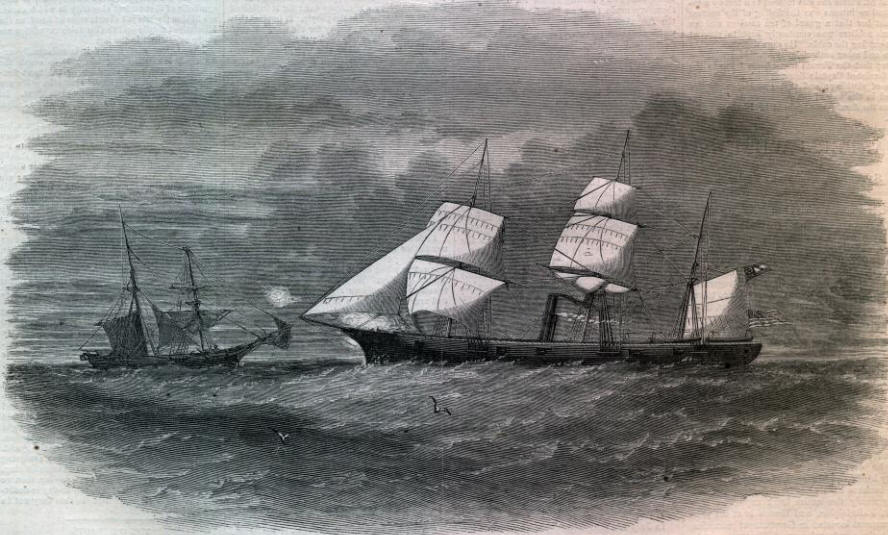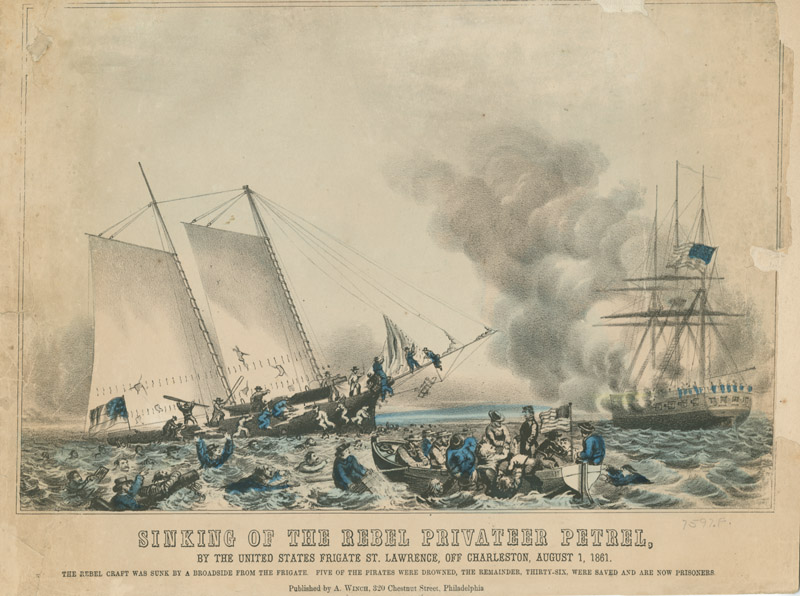Gideon Welles’ program to reform the Navy and supply it with the vast numbers of new vessels it would need to support the Northern war effort (and deter possible European threats) was tremendously successful. But like all such programs, it took time, and Southern privateers had a narrow window of opportunity to operate before the superior power of the U.S. Navy could be brought to bear.

Privateer Sumter intercepts brig Joseph Parks
Southern privateers began hauling their prizes into New Orleans as early as May 1861. These early war privateers were typically smaller vessels, refitted for war, that operated close to the coastline and pounced upon unsuspecting Northern merchantmen. In confrontations with United States naval vessels, they were outmatched and typically captured or sunk. Nevertheless, they operated in great numbers and with some success for the first year of the war, until the blockade—which made returning prizes to port difficult—began to take effect, and would-be entrepreneurs turned to blockade-running.
A look at Confederate records (which admittedly may be less than complete) is illustrative here. Of the 25 recorded privateers, only nine ships actually succeeded in making any captures at all, but those nine seized between them 27 Northern ships. One ship, the Jefferson Davis out of Charleston, captured eight vessels by itself. New Orleans (ten ships) and Charleston, South Carolina (eight ships) were the most common ports of origin for these privateers, but ships out of North and South Carolina accounted for a majority (19 total) of the prizes, probably due to their proximity to Northern shipping lanes. While most privateers were registered and most prizes were taken in 1861, the schooner Retribution,1 operating out of Galveston, Texas, seized three vessels in 1863.

The specter of Southern privateers (or “pirates,” as they were sometimes referred to in the Union) was alarming enough to the Union that they briefly determined to treat the privateer’s crews as actual pirates instead of prisoners of war. However, nothing ultimately came of this threat, as Southern authorities vowed retaliation if any privateer crews were executed.
While the heyday of Southern privateers was brief and the losses they inflicted on Northern shipping modest, it should be viewed as a very successful endeavor when the situation of the Confederacy is remembered. They served as a stop-gap solution for the South until they could produce dedicated commerce raiders, and at essentially no cost to the Southern government,2 they were able to harass Northern shipping, oblige Union naval vessels to watch for privateers, and add to the South’s small pool of ships by seizing enemy commerce.
Although the tightening of the blockade eventually smothered Southern privateering efforts, issuing letters of marque allowed the South to carry out aggressive operations at sea at a time when it had practically no Navy. They also served as a sort of early prototype for the South’s dedicated commerce raiders, the first of which we will take a look at in our next installment.
1 With a name like that, I can’t help but suspect a Hollywood-worthy story behind this vessel. ⇑
2 bean: It's worth pointing out that there was a cost to the people operating the privateers. In every case I'm aware of, privateering on net cost those who engaged in it more than they made from captured ships. That's not to say that a few people didn't get rich from it, but in general, privateering was a gamble, and one that rarely paid off. From the perspective of the government, though, it was a way of mobilizing resources that it otherwise would have been unable to use. I go into this more here. ⇑

Comments
...And a fellow named Horace Hunley - yes, that one - was also a fully authorized privateer.
I went to look up the Retribution, because the name twigged a memory (perhaps falsely, because I can't find anything). However, I did run across this in the process: an 1863 New York Times article from someone captured by the ship. Including the claim of piracy, and the author whining about having been captured by someone from Nova Scotia. (It uses the third-person common at the time, but Case is the author)
https://www.nytimes.com/1863/03/15/archives/the-rebel-pirate-retribution-capture-of-the-schooner-hanover-of.html
Would there be a good explanation for why privateers made so relatively small a contribution in the Civil War compared to the American Revolution?
I'm guessing that having French ports to operate from and send prizes to, proved very helpful in the 1770's, and their absence in the 1860s made a difference. Also, perhaps, that there were a lot of New England privateers in the Revolution and not so much native Southern shipbuilding in the Civil War. But were there any additional factors, maybe technical problems with steamships instead of sailboats as privateers?
Privateers during the revolution were not particularly effective, either. They've never worked all that well. The transition from sail to steam did change things, in that all sailing ships have the same range, while bigger steamships have longer ranges. This changed a lot of stuff about trade protection.
From what I can tell, the North's blockade was just really damn good in the Civil War, particularly after the first year or so. The South didn't have much in the way of maritime infrastructure, and the North had quite a lot, so they just strangled all the Confederate ports. Privateering works a lot less well when you have few open ports and no extant (armed) merchant marine.
Also, for any Southern Gentleman(tm) with a fast ship, blockade running was much more profitable than privateering. You had to pay for your cargo rather than take it, but you got to select the cargo for maximum profitability in Confederate ports rather than take whatever a Yankee merchant happened to be carrying, you could sail with a much smaller crew, and all of Europe's ports were open to you.
Of further annoyance to the Confederate government, not only was blockade running more profitable than privateering, running the blockade with silk and wine was more profitable than running the blockade with arms and ammunition.
John Schilling said... Of further annoyance to the Confederate government, not only was blockade running more profitable than privateering, running the blockade with silk and wine was more profitable than running the blockade with arms and ammunition.
...The CSA had a law that specified that blockade runners were supposed to carry cargoes of strategic necessity instead of luxuries, but enough goods of sufficient luxury were making it through to insure people were getting away with it. Had the CSA enforced the hell out of it, they might well have been able to extend the war by a year or so - wouldn't have ultimately made any difference in the end, but the potential was there.
If the CSA had gotten serious about enforcing that law, and I'd been in charge of the blockade, I'd have responded by allowing ships carrying only luxury goods to pass through unmolested. Any other cargo results in seizure and the usual procedures being carried out.
Wow, that's a great find, Alsadius! That was fun to read.
I don't really think that an increase in military supplies from Europe would have extended the South's ability to fight the war. From what I understand, the South was able to produce about as much gunpowder and small arms as they needed, and I don't think that, say, better artillery would have changed the course of the war.
Ultimately the South needed to break Union morale before they lost the manpower and territorial integrity to continue fighting, and they just weren't quite able to do it.